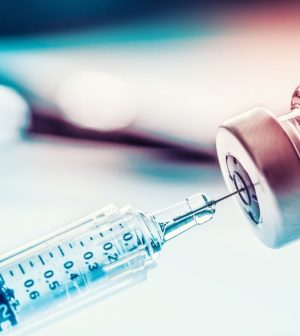- Could Your Grocery Store Meat Be Causing Recurring UTIs?
- Are You Making This Expensive Thermostat Error This Winter?
- Recognizing the Signs of Hypothyroidism
- 10 Strategies to Overcome Insomnia
- Could Artificial Sweeteners Be Aging the Brain Faster?
- Techniques for Soothing Your Nervous System
- Does the Water in Your House Smell Funny? Here’s Why
- Can a Daily Dose of Apple Cider Vinegar Actually Aid Weight Loss?
- 6 Health Beverages That Can Actually Spike Your Blood Sugar
- Treatment Options for Social Anxiety Disorder
FDA Panel OKs New COVID Vaccine for Fall

A U.S. Food and Drug Administration advisory panel on Wednesday recommended updating the formula for COVID vaccines ahead of a fall campaign that will encourage Americans to get the latest shots.
The unanimous vote recommends that vaccine makers tailor the next vaccine to target the JN.1 variant, which dominated infections in the United States last winter, the New York Times reported. However, JN.1 has been overtaken by descendants known as KP.2 and KP.3 this spring.
The FDA is expected to formally recommend a new variant target for vaccine makers in the coming weeks, the Times reported.
Dr. Peter Marks, who oversees the FDA’s vaccine division, urged the committee to consider encouraging the mRNA vaccine makers to focus on the latest versions of the virus, and not the JN.1 variant, the Times reported.
“We always say we shouldn’t be chasing strains, but we’re paying an incredibly high premium for mRNA vaccines to be able to have the freshest vaccines,” he said, referring to the technology used by Moderna and Pfizer.
“If this evolves further in the fall, will we regret not having been a little bit closer?” Marks asked.
But Dr. Sarah Meyer, a senior vaccines official at the U.S. Centers for Disease Control and Prevention, said that aiming at JN.1 was more appropriate because it was “further up on the tree” in the evolution of the coronavirus, possibly allowing the vaccines to better cover future mutations in the virus, the Times reported.
The panel’s decision mirrors guidance from a World Health Organization expert committee that recommended in April that COVID vaccines switch to a JN.1 formulation.
Representatives of Moderna and Pfizer said that the companies would be ready to produce either version of the vaccine, the Times reported.
During the meeting, federal health officials reported that COVID cases remain relatively low, with data showing that illnesses from JN.1 were not more severe than those from earlier variants, the Times said.
Less than 400 COVID deaths a week have been recorded recently, down from a peak of roughly 2,500 a week over the winter.
Still, last year’s COVID vaccination rate was markedly low, with CDC researchers reporting that only 18 percent of immunocompromised adults had gotten the updated vaccine, while just over 20 percent of all adults had received the shot.
As for nursing home residents, the most likely to suffer from severe illness, CDC data shows that about 30 percent of nursing home residents are up-to-date on their shots, down from 65 percent two years ago.
More information
The CDC has more on COVID vaccines.
SOURCE: New York Times
Source: HealthDay
Copyright © 2026 HealthDay. All rights reserved.










